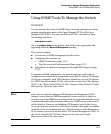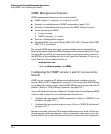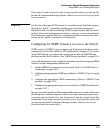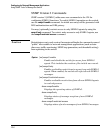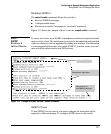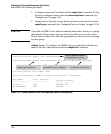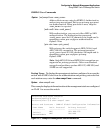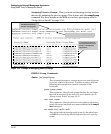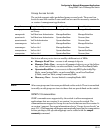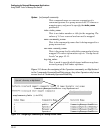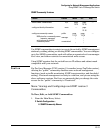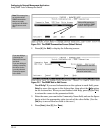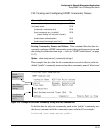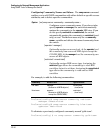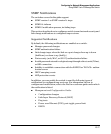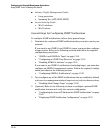
Configuring for Network Management Applications
Using SNMP Tools To Manage the Switch
Group Access Levels
The switch supports eight predefined group access levels. There are four
levels for use with version 3 users and four are used for access by version 2c
or version 1 management applications.
Group Name Group Access Type Group Read View Group Write View
managerpriv Ver3 Must have Authentication ManagerReadView ManagerWriteView
and Privacy
managerauth Ver3 Must have Authentication ManagerReadView ManagerWriteView
operatorauth Ver3 Must have Authentication OperatorReadView DiscoveryView
operatornoauth Ver3 No Authentication OperatorReadView DiscoveryView
commanagerrw Ver2c or Ver1 ManagerReadView ManagerWriteView
commanagerr Ver2c or Ver1 ManagerReadView DiscoveryView
comoperatorrw Ver2c or Ver1 OperatorReadView OperatorReadView
comoperatorr Ver2c or Ver1 OperatorReadView DiscoveryView
Each view allows you to view or modify a different set of MIBs.
■ Manager Read View – access to all managed objects
■ Manager Write View – access to all managed objects except the follow-
ing: vacmContextTable, vacmAccessTable, vacmViewTreeFamilyTable
■ OperatorReadView – no access to icfSecurityMIB, hpSwitchIpTftp-
Mode, vacmContextTable, vacmAccessTable, vacmViewTreeFami-
lyTable, usmUserTable, snmpCommunityTable
■ Discovery View – Access limited to samplingProbe MIB.
Note All access groups and views are predefined on the switch. There is no method
to modify or add groups or views to those that are pre-defined on the switch.
SNMPv3 Communities
SNMP commuities are supported by the switch to allow management
applications that use version 2c or version 1 to access the switch. The
communities are mapped to Group Access Levels that are used for version 2c
or version 1 support. For more information refer to “Group Access Levels” on
page 13-11. This mapping will happen automatically based on the communities
access privileges, but special mappings can be added with the snmpv3
community command.
13-11



